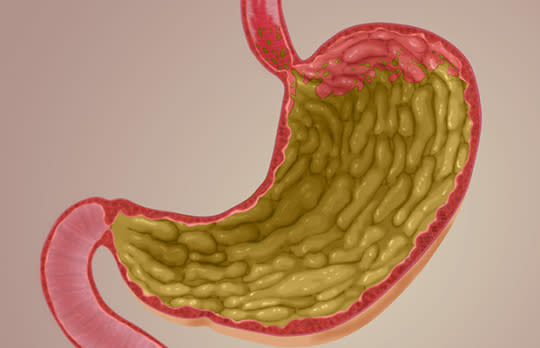6 Things Your Hiccups Are Trying To Tell You

(Photo: Getty Images)
A hiccup usually means one of just a very few things: You ate that burger way too fast, you washed it down with that beer way too fast, or you got a little overexcited that you were about to have a burger and a beer.
These are occasional hiccups that rarely last more than a few minutes. “All a hiccup is is an abrupt closure of your vocal cords,” says Kenneth Brown, MD, a Dallas-area board-certified gastroenterologist and the cofounder and chief medical officer of Atrantil supplements. The vocal cords snap shut thanks to an involuntary contraction of your diaphragm. “It’s an electrical current making the diaphragm jump when it shouldn’t, like a little spark going off,” he says. Sounds (relatively) harmless.
(Make 2016 YOUR year! Order Prevention’s calendar and get daily inspiration to live your best life.)
But in some instances, hiccups can become a little more troublesome. Anything that irritates the diaphragm, or the vagus nerve that runs through it from your brain to your belly, can lead to hiccups, and sometimes—although it’s rare—those irritants can be serious.
Technically, Brown says, “persistent” hiccups last more than 48 hours. “Intractable” hiccups last more than a month. (Can’t. Even. Imagine.) He admits those are pretty generous categorizations. “Anybody who’s had hiccups for more than 48 hours would go in and get them checked out,” he says, and even 12 hours is enough to warrant a doctor visit.
Related: 13 Power Foods That Lower Blood Pressure Naturally
That doesn’t mean you should expect the worst the next time you find yourself unable to get a word—hic—out—hic. We just think you should know what you’re up against, should you need to get thee to a doctor. If you have other symptoms, like fever, pain, or shortness of breath, here are a few things those hiccups could actually mean.
You might have acid reflux.

(Photo: Getty Images)
Bloating and heartburn can irritate the diaphragm, Brown says, and these types of GI issues are a major cause of persistent hiccups. The good news is that treating the GI problems usually gets the hiccups to vanish, too. So if yours just won’t let up, and if you’ve also got that trademark burning pain in your stomach, chest, or throat, consider bringing up your symptoms with your doc.
Or nerve damage.
Maybe your spastic diaphragm is linked to damage to that vagus nerve, whether it’s temporary, due to tonsillitis or a hair tickling your eardrum (this is a thing!), or permanent, like from a tumor or an accident. Just about anything that screws with the nerve’s work throughout your neck, throat, chest, and abdomen can lead to disruptive hiccuping, Brown says.
Related: 7 Weird Things Your Teeth Are Trying To Tell You
You could be having a stroke.

(Photo: Getty Images)
A serious case of the hiccups—so bad that you’re likely to drag yourself to the ER—can actually be a sign of a stroke. Experts don’t totally understand why, except that a particular type of stroke, one that occurs in the back of the brain rather than the top, is linked more often to hiccuping, and it’s a type of stroke seen more frequently in women. These stroke-signaling hiccups would typically be accompanied by chest pain, numbness, or a little blurry vision, but the hiccups are likely to be so bad, you might not even notice other symptoms.
Or your kidney function could be slipping.
There aren’t a lot of clues that your kidneys are in trouble, but if you’re slowly losing kidney function, toxic waste products the organs would typically usher out may begin to build up in your body, Brown says. That’s not so comfy for the diaphragm and vagus nerve and might result in frequent hiccups, one of just a handful of signs of worsening kidney function. If your hiccups are paired with muscle twitching, excessive thirst, or increased pallor in your skin, bring ‘em up with your doctor. Kidney-related hiccups may be a sign you’ll need treatment, Brown says. “We often see hiccups before dialysis, and then they start to go away.”
Related: Drink This, Sleep 90 Minutes More A Night
You might (but you probably don’t) have a brain tumor.
A 2010 BBC documentary profiled Chris Sands, who tried for more than 4 years—years!—to quell a debilitating case of the hiccups before he was diagnosed with a tumor on his brain stem, home to the beginning of the vagus nerve. It took doctors 3 hours to remove two-thirds of the tumor, according to the BBC. Four months after surgery, Sands was hiccuping noticeably less, but expected to stop altogether when the swelling from the procedure had subsided. Keep in mind it’s beyond rare and file this information away as “possible but not probable.”
Related: 25 Delectable Detox Smoothies
Or you could (maybe, possibly) be pregnant.

While there’s little to no scientific explanation for this one, Brown says, there are a number of women who claim one of the first ways they know they’re pregnant is more frequent hiccuping. It’s possible, Brown says, that hormonal changes or swings in stress levels might lead to more anxiety-induced hiccups. Or maybe it’s an uptick in acid reflux, common during pregnancy, leading to the hiccups. But it may also be a little wishful thinking: If you’re hoping you’re preggers, you may be guilty of reading into every hic and burp and grumbling of your stomach, simply thinking your body’s up to something new. We say go old-fashioned: Wait until you’ve actually missed a period.
By Sarah Klein
This article ’6 Things Your Hiccups Are Trying To Tell You’ originally ran on Prevention.com.
